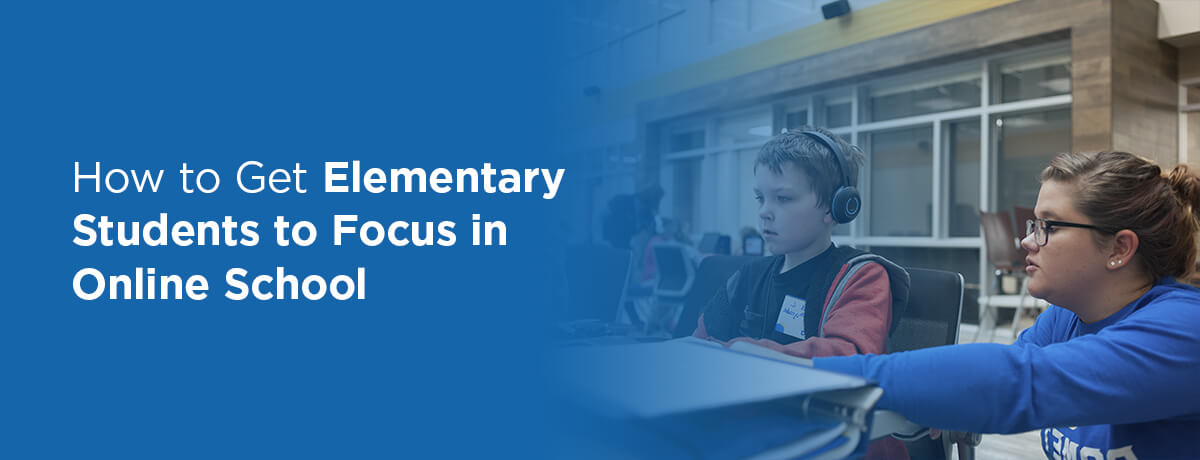Enrollment Now Open for Second Semester. Click Here
Enrollment Now Open for Second Semester. Click Here

Understanding how to focus better in online school is vital to your child’s academic success. Students enrolled in online schools have a lot of flexibility, and it can be easy for them to lose focus as they work from home. Implementing strategies to keep students focused, such as developing a routine and eliminating distractions, can help your child find a better balance between school and play.
Schedules can help children feel comfortable in their environment, understand what comes after their current activity, and engage in learning, so developing a daily routine can help keep your student focused.
Tips to keep elementary students focused with routines include:
Every child works differently. Some children can work for hours before needing a break, while others benefit from short breaks throughout the day to expend energy and stay focused. Understanding how long your child can stay productive can help you figure out when to dedicate time to nonacademic activities.
Depending on your child’s challenges, they may struggle with their focus for various reasons, with a common factor being pent-up energy. When children have too much unreleased energy, they can start to engage in off-task behavior that can impede their academic progress. It’s important to encourage your child to take breaks throughout the day so they don’t burn out with their school work.
Encourage your child to try these activities to release some of their energy when learning:
Outdoor activities to release energy during breaks include:
If your child tends to get more excited after releasing energy, encourage them to do activities that challenge their mind instead, such as building with Lego bricks, cutting letters out of empty cereal boxes, making a house of popsicle sticks, playing a card game, or reading their favorite book outside.
Food is just as important for your growing child to encourage healthy habits and productively get through their school day. When your child is learning from home, it can be easy for them to reach for the chips and snacks they love, but that slows their cognitive abilities.
Leafy green vegetables, berries, tea, fatty fish, and walnuts are all foods that can improve your brainpower. Some of these foods can enhance memory, while others provide a sense of focus. Incorporating some healthy snacks and meals can help keep your child on track throughout the day.
Your student might enjoy food such as:
It would be best if your child avoided eating candy and sugary foods or drinks during the school day. These foods can give them high energy and make focusing much more difficult. When they eat food that makes their bodies feel good, they’ll be able to work through their day with more focus and productivity.
Finding the perfect place for your child to dedicate time to their schoolwork while remaining comfortable and focused can be challenging. Still, to keep your student engaged, you should eliminate as many environmental distractions as possible.
Consider removing these distractions:
Although many people like to believe they can effectively multitask, the truth is that we can’t. When we try to do two things simultaneously, our minds are always more focused on one task than another. Multitasking increases the chances that we’ll make a mistake and can cause anxiety. Help your child stay on task and focus by eliminating the distractions that impede their academic progress.
You can easily motivate your student by helping them create their own goals and rewarding them for their accomplishments. A goal might be to complete a project earlier than the due date or to get all their schoolwork done before dinner.
Once you establish the goal, have your child write it down somewhere they can see every day. As they work toward their goal, reward them for one behavior at a time. For example, you could promise your student a movie night if they pass their class with a B or higher. Give them a sticker for passing a test or let them choose what your family has for dinner when they get an A on a project.
Your rewards don’t have to be huge or money-based, but they should encourage your child and help them realize they’ve accomplished something.
You should also acknowledge your child’s efforts even if they fail. Remind them that they are still growing and gaining experience, and encourage them to try again rather than dwell on failure. Furthermore, avoid rewarding them for everything. If they receive gifts or prizes for every behavior, they’ll begin to expect rewards all the time. Balance their goals and rewards and encourage them to recognize their progress.
Commonwealth Charter Academy is a public online charter school for K-12 students. We know a thing or two about learning online, and we can help keep your child on track. We want your child to succeed just as much as you do, so we create individualized learning plans for each child that challenge them to reach their highest potential and encourage them to pursue their interests.
Cyber school with CCA provides flexibility and promotes focus. We incorporate breaks into our class schedules and encourage our learners to participate in activities that help them get through their day.
Request more information from CCA to find out what you can do to improve your child’s focus as they navigate online learning.
Enrollment Now Open for Second Semester. Click Here